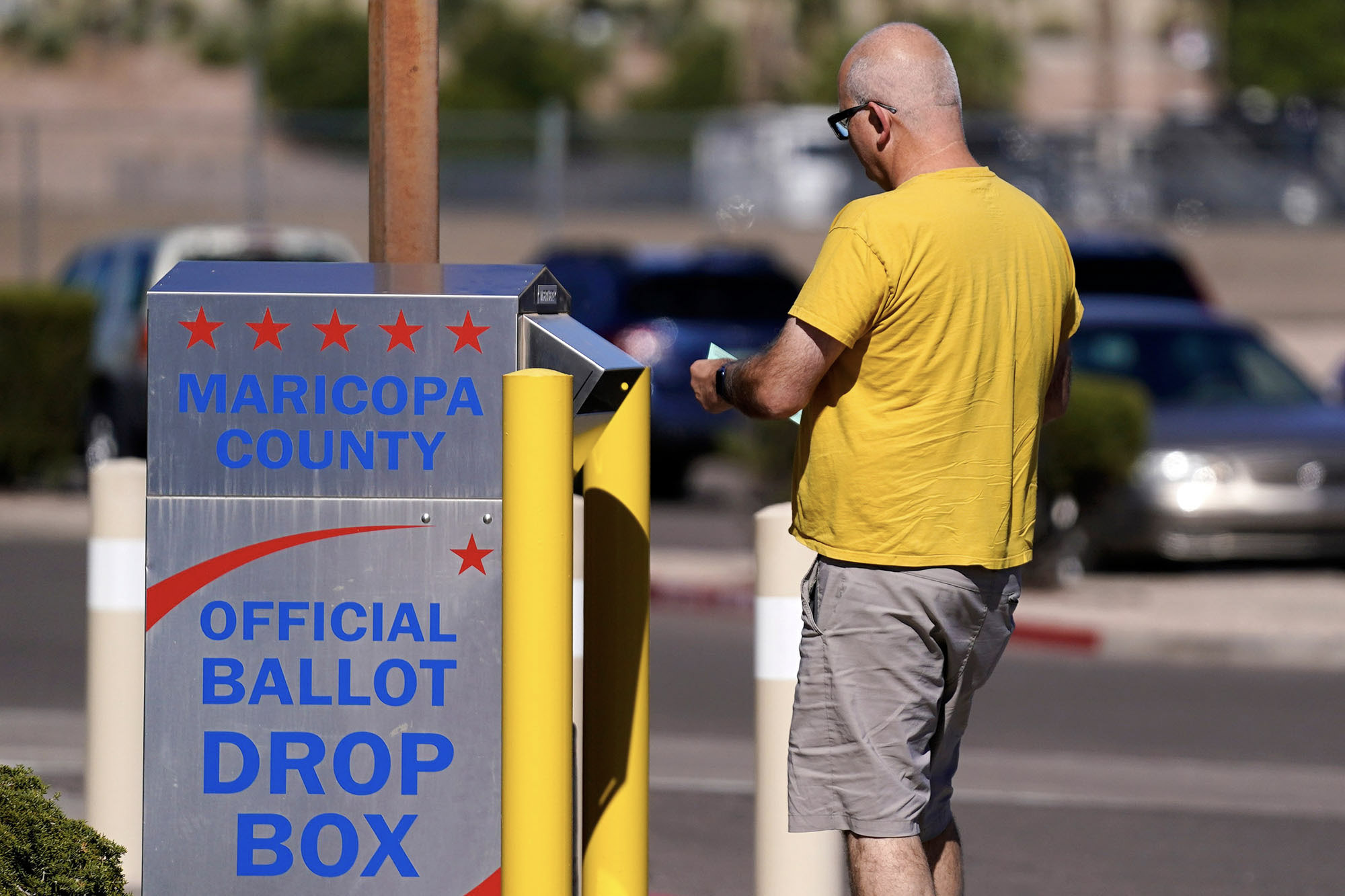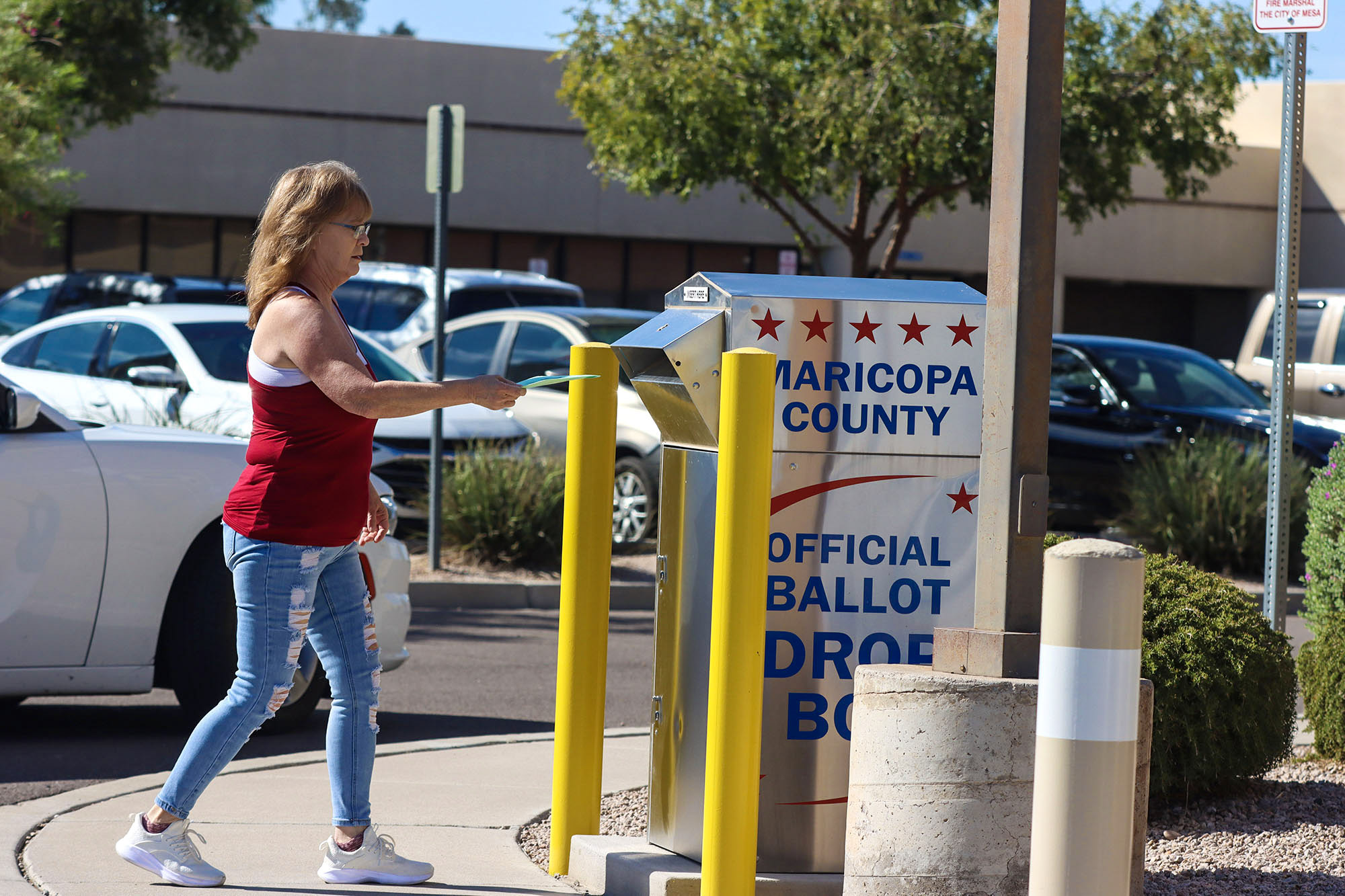Indianz.Com > News > Cronkite News: Judge won’t stop groups from watching ballot boxes
Judge: Ballot drop-box watchers are not a ‘true threat,’ cannot be blocked
Wednesday, November 2, 2022
Cronkite News
WASHINGTON, D.C. — A federal judge Friday refused to block groups that are monitoring ballot drop boxes, saying voters who complained of intimidation had not shown that the watchers posed a “true threat” to their voting rights.
U.S. District Judge Michael Liburdi said he struggled to find a way to help voters who are “legitimately alarmed by the observers filming” at the drop boxes, but he could not do so without violating the First Amendment rights of the box watchers.
Voto Latino and the Arizona Alliance for Retired Americans, who brought the suit against Clean Elections USA and its director, Melody Jennings, had already filed a notice by Friday evening that they plan to appeal Liburdi’s ruling to the 9th U.S. Circuit Court of Appeals.
Jennings celebrated the decision in a Truth Social post Friday, saying “the constitution won today” and that the ruling was a “step for freedom,” then urging her supporters to vote.
“If you so choose to vote at a drop box, box watchers may be at the boxes where you go,” Jennings wrote. “Wave and thank them for protecting your freedom.”


More from Cronkite News
Voters testify to fear at ballot drop boxes, urge judge to halt monitors (October 26, 2022)
For more stories from Cronkite News, visit cronkitenews.azpbs.org.
Note: This story originally appeared on Cronkite News. It is published via a Creative Commons license. Cronkite News is produced by the Walter Cronkite School of Journalism and Mass Communication at Arizona State University.
Search
Filed Under
Tags
More Headlines
Native America Calling: Native Bookshelf with Tanya Talaga
Native America Calling: Where Donald Trump finds support among Native Americans
AUDIO: Subcommittee Markup of Fiscal Year 2026 Interior, Environment, and Related Agencies Bill
AUDIO: H.R.410, the Alaska Native Vietnam Era Veterans Land Allotment Extension Act
AUDIO: H.R.504, the Miccosukee Reserved Area Amendments Act
Statement: William “Billy” Kirkland nomination hearing as Assistant Secretary for Indian Affairs
Native America Calling: Tribes insist on protections for wolves in the face of public pressures
George Ochenski: Another shameful chapter in treatment of tribal nations
Montana Free Press: Tribes challenge changes in voter registration laws
Cronkite News: Democrats head to primary to fill seat of the late Raúl Grijalva
House of Representatives adds two Indian Country bills to agenda
Tom Cole: The ‘One Big Beautiful Bill’ is a win for America
NAFOA: 5 Things You Need to Know this Week (July 14, 2025)
Chuck Hoskin: Cherokee Nation focuses on culture
Native America Calling: What the Texas flash floods teach us about emergency preparedness
More Headlines
Native America Calling: Where Donald Trump finds support among Native Americans
AUDIO: Subcommittee Markup of Fiscal Year 2026 Interior, Environment, and Related Agencies Bill
AUDIO: H.R.410, the Alaska Native Vietnam Era Veterans Land Allotment Extension Act
AUDIO: H.R.504, the Miccosukee Reserved Area Amendments Act
Statement: William “Billy” Kirkland nomination hearing as Assistant Secretary for Indian Affairs
Native America Calling: Tribes insist on protections for wolves in the face of public pressures
George Ochenski: Another shameful chapter in treatment of tribal nations
Montana Free Press: Tribes challenge changes in voter registration laws
Cronkite News: Democrats head to primary to fill seat of the late Raúl Grijalva
House of Representatives adds two Indian Country bills to agenda
Tom Cole: The ‘One Big Beautiful Bill’ is a win for America
NAFOA: 5 Things You Need to Know this Week (July 14, 2025)
Chuck Hoskin: Cherokee Nation focuses on culture
Native America Calling: What the Texas flash floods teach us about emergency preparedness
More Headlines